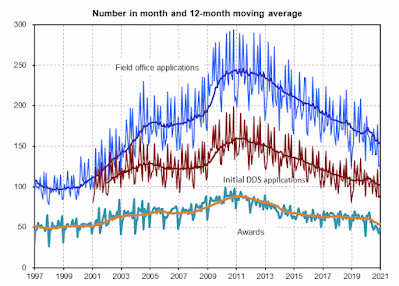From an op ed by Jonathan Stein and David Weaver in the New York Times:
At a time when the pandemic has hit the disabled and elderly the hardest, they also face the erosion of a critical income lifeline, Supplemental Security Income (S.S.I.). The program has collapsed during the pandemic: From July to November 2020, the Social Security Administration awarded benefits to about 100,000 fewer individuals compared with the same period last year. In July 2020 the agency distributed just 38,318 new awards — the fewest in 20 years of available data.
At this rate, more than 230,000 low-income disabled and elderly Americans will miss out on vital cash benefits and access to health care (via Medicaid, which S.S.I. recipients generally qualify for) in one year. ...
The immediate cause of this ongoing crisis is the closure of Social Security’s network of 1,200 field offices during the Covid-19 pandemic. Generally, the agency does not take online applications for S.S.I. benefits, leaving these disabled and elderly people with one primary service option: calling its overburdened general phone line. Further, the field offices were a source of information and assistance for millions of Americans, many challenged by cognitive, learning, language and poverty-related issues. ...
Even before this crisis, two-thirds of those who completed the initial 23-page application for the program failed to qualify under the current burdensome disability and means tests. ...
Social Security executives are aware of the existing and pandemic-era challenges and are making good-faith efforts to address them, including a rare and laudatory engagement with claimants’ advocates. But these important steps by the agency are undermined by an effort to close the doors to hundreds of thousands of claimants during a time of economic collapse and labor market contraction. ...
The S.S.I. elderly and disabled await Jan. 20, and a Biden White House that understands their plight.
